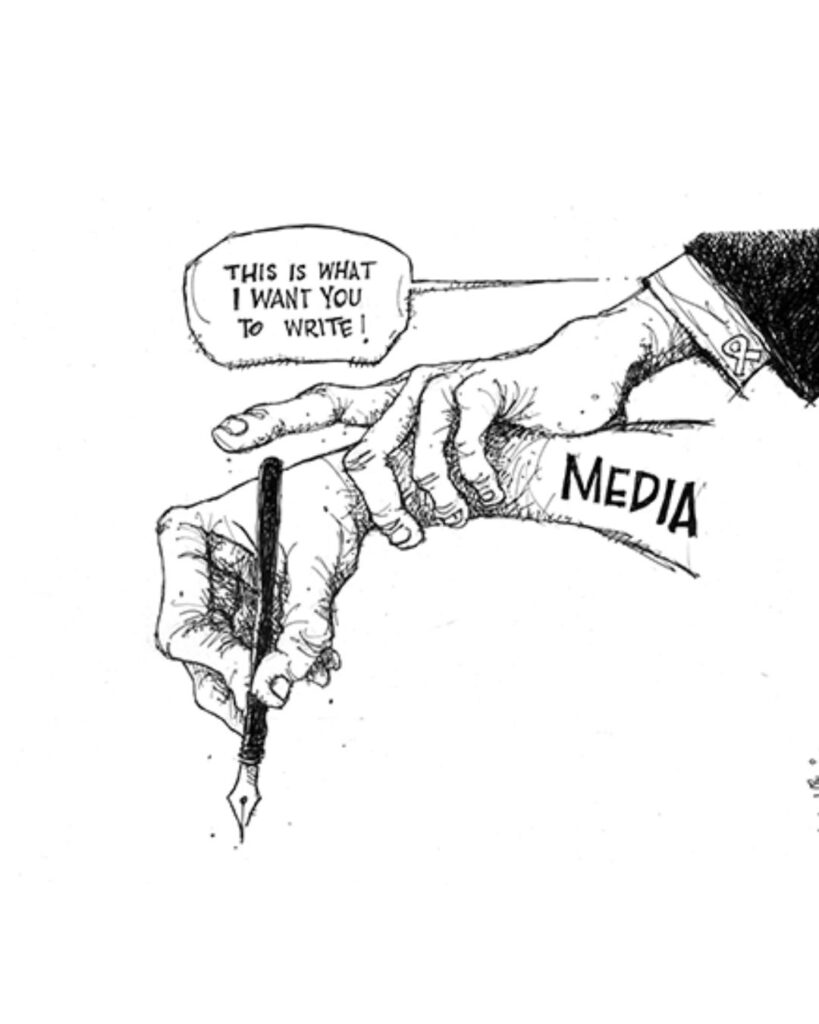The Burden Of Truth: Is Journalism Dying?

Hear me out when I say this: there are certain professions that this society promotes or discards. For example, engineering v/s journalism.
I’m sure someone from your family is or was an engineer. And in contrast, how many people do you personally know who are or were journalists? Well, that’s because engineering is charming (or was, at least for our parents), but journalism? Not really.
Even today, if you ask students of the media, what they want to do in the future, they’ll never say journalism. The pay is too little or it’s not worth the risk, especially given how India is in 2025.
But what “risks” are we talking about here?
I recently came across this story of a young investigative journalist who got into trouble because she could dream of the crime, and get those cases published before the police could even look at it .Things got progressively worse for her as the police thought she was behind the crimes so that she could become successful. (It’s called The Brown Book) The story, even though fictional, got me thinking about how scary and “risky” investigative journalism is, especially when you are burdened with truth but can’t seem to get it out.
Let’s say a journalist who wants to report on corruption, corporate fraud, or anything that even remotely harms the government’s image or involves the government in some way is in trouble. We have so many laws, like Defamation and IT Law, Sedition Laws, Whistleblower Protection Act, etc., that prevent society from knowing the whole picture.
Did you know that there is a law called UAPA or the Unlawful Activities Prevention Act, which originally was meant to control terrorism and is used against investigative journalists? Subtle way of categorising, no?
As a matter of fact many journalists like Siddique Kappan, a regular contributor to the news portal Azhimukham, have faced jail time because they reported in cases like a dalit girl getting raped.
No wonder fewer and fewer people want to write for the public.
Sadly, this is just the tip of the iceberg. Once under the government’s eye, you’ll be tracked online as well. Not even your emails or SMS are safe.
Imagine being a journalist and swearing to bring the whole picture about a corporate-government organisation that has done some fraud, maybe allegedly stealing lands from farmers, you promise to bring this up to the public, but end up with a notice from the court about a false tax evasion, and getting your phone tapped, and getting calls anonymously to stop. And if this was not enough, because of the lack of support, you are forced into exile.
This might sound like some hocus pocus-ish story, but Rana Ayyub, opinion columnist with The Washington Post, faced a similar scenario where she had to flee the country because she didn’t feel “safe anymore”.
Speaking of journalists, did you know Sateyndra Dubey, the project head of National Highway Authority of India, Koderma, Jharkhand, got fired from his government job because he thought he must leak classified documents that showed the public funds were being funnelled for a party’s campaign instead of going towards education, like it was supposed to?
You’d think that getting fired for leaking something in our office is fair, right? Well, he wasn’t just fired, he was murdered. Yes, in 2003, he was killed for being too honest. Scary, isn’t it?
Is it too late to remind you that the essential job of any government is to protect its citizens, and as a matter of fact, by law, is required to protect such truth-revealing journalists?
If you feel like all these cases were pretty old and may not be relevant in today’s scenario, then my friend, the story about how Ravish Kumar quit, might make you upset.
For those of you who don’t know, Ravish Kumar was a well-known senior journalist of NDTV. He would, fearlessly, dig up stories and cases about the wrongs and frauds happening around us. But when Adani took over NDTV, he resigned. Is it some mere coincidence?
He does operate outside mainstream media, like on YouTube or other mediums, but his resignation signified the downfall of journalists.
See, I can keep on going with more cases and examples, but it won’t matter. Paranjoy Guha Thakurta, Swati Chaturvedi, and Punya Prasun Bajpai are just a few forgotten journalists who faced immense scrutiny for being honest and true to their work. Sadly, most of us aren’t even aware of their lives and their work. We should be honouring them the same way we honour cricketers. They deserve our respect as well, after all, they choose to talk about it, knowing the risk, weighing the consequences, they are the ones burdened with the truth.
What will really make an effect is us all stepping up and taking their side. If the media is not allowed to be a watchdog, society needs to step up; you and I make this society. We need to voice against the wrongs/ and not let those suppress our voices, and let them speak their minds. It’s time we stop burdening ourselves with truth but say it fearlessly. We need to save journalism before all we start hearing is noise and not actual news, because true journalism isn’t dying, true journalists are being killed.
Thanks for reading, fr! Share if you like it enough. Follow us on Instagram & LinkedIn for more.


